A first in UAE, Emirati tour guide opens her home to wide-eyed tourists
Maitha Essa, the UAE’s first certified Emirati home experience guide, offers an insight into the life and traditions of Emiratis. Zenifer Khaleel joins one of the tours
Why do most Emirati houses have two entrances? What is the right way to greet an Emirati woman? Why were deaf people employed as coffee servers in majlises in ancient times?
Although the 30-something Indian expat Julia John was born and raised in Abu Dhabi, she was not aware of a lot of heritage or cultural norms and etiquette of the UAE. Her husband Sajan Scaria, an equipment manager based in the capital for the past 12 years, was equally clueless.
‘The UAE is a dream destination for expats like us and we are given the freedom to observe our faiths and follow our traditions,’ says Julia. ‘Christmas and Diwali is celebrated with the same fervour as is Eid. Yet the cultural exchange seems to be one-sided as we [expats] really don’t know a lot about the customs, traditions and heritage of the country we are living in.’
Also read: Built in 1845, these forgotten Sharjah homes reclaim their pride of place
Sajan couldn’t agree more. ‘Whenever friends and family come visiting to the UAE, they are amazed by the opulence, cleanliness, safety and infrastructure of this country,’ he says. ‘But I don’t know of many places where I could take them to so they can get an insight into Emirati culture as well.’
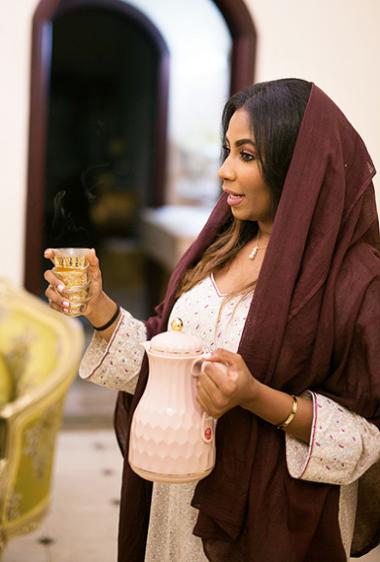
So when the couple got an opportunity to enjoy a traditional Emirati home experience, Julia decided to sign up immediately.
An initiative by 26-year-old Emirati entrepreneur Maitha Essa, the attempt aims to provide expats a firsthand experience of Emirati culture by offering an opportunity to mingle closely with a local family, learn about the cultural norms and also enjoy a delicious dinner.
For a fee of Dh450 per adult, Maitha offers guests all of that at her villa in Abu Dhabi’s Mohammad Bin Zayed City where she resides with her family that includes her mother and five siblings.
Lasting around four hours, the interaction gives visitors on invitation, a fairly detailed account of the country, culture and customs while also giving them a chance to dispel any doubts they may have about Emirati etiquette. The icing on the cake? Guests are also treated to an Emirati dinner including coffee and dates.
Maitha, who works in the investigative and audit department of a health insurance company, also enjoys being a tour guide during her off hours. She was one of the first graduates of the pilot Emirati Tourist Guide Training and Licensing programme of the Department of Culture and Tourism, launched last November and is the only tour operator in the UAE who provides a home experience.

‘A lot of tourists don’t know much about our traditions or are unclear about some customs. I started this experience after I put myself in a tourist’s shoes. If I wanted to experience a country, I’d love to visit houses of the local people rather than just see the tourist hotspots. It would also help to clear a lot of misconceptions,’ says Maitha.
The first inkling the Scarias get that they have arrived at Maitha’s house is the strong scent of Arabic Oudh that wafts in the air. The guests face two entrances – a large one and a slightly smaller one to the left of the main one. Dressed in a mukhawar (a long loose-fitting gown) her head covered with a sheyla (head scarf), Maitha welcomes us.
‘The larger entrance leads to the main area of the house and is used by the family; the other one which opens to the majlis (guest room), is for the visitors,’ explains Maitha, gently reminding us to leave their footwear outside as a mark of respect.
Traditionally, the majlis is the designated room for guests, and visitors are not encouraged to go to other parts of the house. It is set up with Bedouin style sofas and low silver-top tables. Adhering to tradition, a dalla (golden coffee pot) and a plateful of dates adorn the centre table.
Emirati houses have separate majlises for men and women. ‘A typical Emirati house has as many rooms as the number of people in the family,’ she says.
Maitha’s home is slightly different in that it has a very contemporary majlis where she hosts all guests – men and women – in one area. It has an eclectic mix of modern and classic with sofa, centre tables and show pieces. What is essentially Emirati are the dates and the kahwa (Arabic coffee).
While it is not mandatory to bring gifts when visiting an Emirati household, you may carry chocolates or a bouquet of flowers as a token of appreciation.
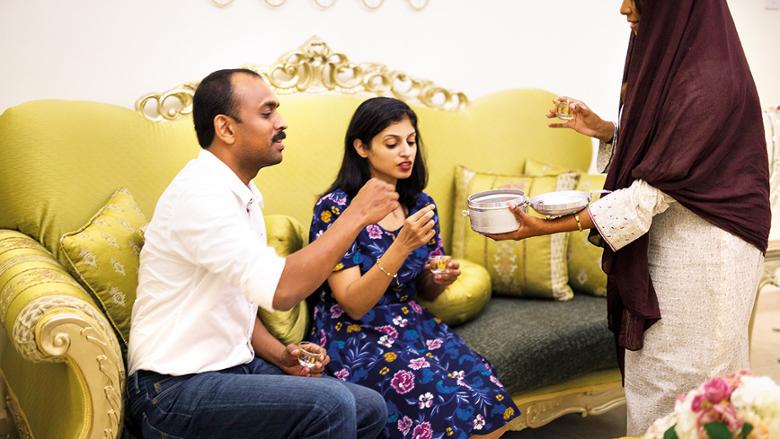
‘Coffee plays a very important role in our hospitality and it is considered impolite for guests to refuse it,’ she says. ‘Only a fourth of the cup is filled at a time because we want people to stay longer and chat over refills.’
The coffee is unsweetened but pairing it with dates gives it a very rich and sweet flavour. ‘Dates are preferred to be taken in odd numbers as that is the Sunnah (tradition) of Prophet Muhammed (PBUH),’ she says.
The ritual of serving coffee follows stringent protocol. If it is the male majlis, the youngest able male member in the host’s family is expected to serve the eldest among the guests (in age or by virtue of position).
Once the elders are served, the rest of the guests are served beginning from the right side of the room. Guests stretch out their hands if they need more coffee. If they are done, they jiggle the cup – an indication to the server that they don’t need anymore. The server is expected to remain standing and in silence until the last guest has had his fill of coffee after which the cups are removed from the table.
‘I always bear the brunt of being the server as I’m the youngest,’ says Maitha, with a laugh.
The hand movements with the coffee cups have special significance. ‘The majlises of yore were meeting areas where discussions usually of a very sensitive nature were held. Very often, deaf people were employed as servers as the tribal heads did not want anyone eavesdropping over their conversations. That’s a reason hand gestures were used as signals for the servers to refill the cups,’ she says, serving the guests a cup of coffee.
‘The mens’ majlises are usually more rigid and formal where the talk is mostly related to business. Children as young as seven were taken to majlises and mosques to learn about religion, culture, etiquette and manners. Women’s majlises are more social gatherings, where you can relax and enjoy.’
The sound of a bird fluttering its wings makes Julia, who is engrossed listening to the cultural dos and don’ts, look up. Perched in the corner of the room is an eyass (a falcon chick). Maitha introduces her as Ghazlan who is being trained to enhance the Emirati home experience.
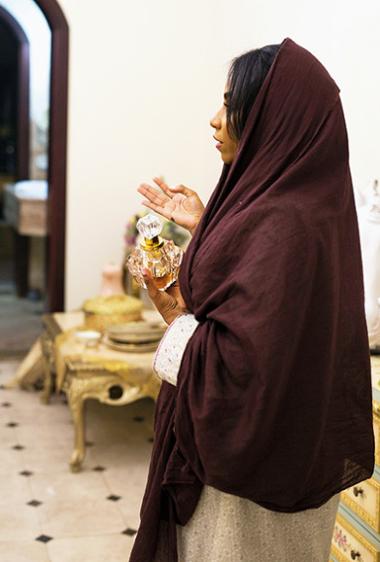
‘What is the correct way of greeting an Emirati woman?’ asks Sajan, explaining that learning the right way would help him when interacting with his Emirati coworkers.
‘A woman is the pride of the family and her honour is protected and guarded. Traditionally she is not allowed to mingle freely with men except with her blood relations (not including cousins),’ explains Maitha.
Even though times are changing, she recommends not being the first to extend the hand for a handshake when meeting an Emirati woman. ‘Most women keep a hand on their chest when they meet a man to signify that they prefer not to shake hands with men. However, if the woman initiates a handshake by extending her hand, there is no harm in doing so,’ she says.
Another form of greeting, the nose touch, is a tradition of desert Bedouins. Maitha throws light on this cultural practice. ‘When Bedouins used to move with their tribes across the desert, they would hold the leash of their camels in their right hand and their swords in their left. Since both hands were not free, the nose touch evolved as a form of greeting,’ explains Maitha.
From the wide-eyed look of the guests it is clear that this information is new to them.
The gracious hostess then offers a lesson about traditional attire. Women typically wear black abayas (gowns) and black sheylas when they step outside. Inside the house, though, they are free to wear clothes of their choices as long as there are no guests or visitors.
‘A common question I am asked by visitors is whether I wear an abaya while sleeping as well,’ says Maitha with a laugh. ‘Inside the house, if there are no guests, we wear pretty much anything we want such as a pyjama set or a pair of jeans and a shirt.’
Janet is keen to know more about the burqa (the cloth mask worn by women over the brow and nose). ‘That was usually worn by married women and mainly to protect her beauty from the harsh sun and the dust,’ explains Maitha.
For men, the pristine white kandoora or dishsdasha, is a symbol of pride. Emirati men can be distinguished from men of other Arab nationalities (like Saudi, Kuwait or Bahrain) by the design on the kandoora. They will have a long plaited tarboosh (white tassel) in front of the kandoora. Omanis wear a smaller tarboosh in the side and Saudis do not have it at all. The Emirati formal wear is a white kandoora with white gutrah (head covering). But for friendly gatherings, they can wear red gutrahs as well.
‘What about marriages,’ asks Julia. ‘How are alliances fixed.’
Traditional marriage proposals were largely arranged from within the community, explains the guide. The womenfolk of the groom visit the prospective bride’s house where she is expected to serve them coffee with all due respect. She is also expected to not wear any make-up. If the groom’s family are pleased with her manners, they inform the elders of the house that they are happy to go ahead. The senior men then meet in the majlis of the groom’s house to finalise the proposal. It is only after this that the bride and groom meet formally.
Maitha is quick to add that times are changing and Emiratis are opening up to the idea of finding their own life partners.
Even as she is explaining about marriage, the delicious aroma of a mutton biryani wafts into the room. Maitha is keen that her guests enjoy the meal in as traditional a fashion as possible. The seating is on the floor around a circular handwoven Arabic mat of date palm leaves.
The appetiser is the melt-in-the-mouth madhrooba (rice cooked with chicken and mashed together). ‘Madhrooba literally means to be beaten up,’ says Maitha, exhorting the couple to have another serving. Next served is the mutton biryani. What makes Emirati food different from other Arabic counterparts is the mix of spices like cardamom, cinnamon and the use of dried lime.
‘Chicken machboos (rice and chicken steamed together) is commonly served,’ says Maitha. ‘But for a change I thought we will go for biryani this time.’
The Scarias soon find their groove of eating seated on the floor. While Julia decides to have a second helping of madhrooba, Sajan tucks into more biryani. ‘We haven’t had an authentic Emirati meal, so the flavours are very new and distinct,’ says Julia.
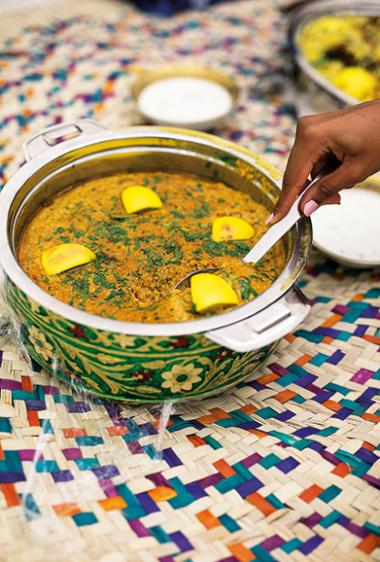
All dishes are prepared at her home with Maitha’s mother overseeing the preparation.
The meal ends with a traditional suleimani (black tea) sweetened and enhanced with cardamom. Dinner over, Maitha introduces the guests to another tradition typical of the region one that invigorates the olfactory senses. Lighting a traditional incense burner with coal, she places a tiny amount of oudh in it.
One of the most expensive perfume ingredients in the world, oudh is obtained from the bark of the agarwood tree that is infected by a certain mould of parasite. Emiratis use oudh that is largely sourced from India and Cambodia. ‘Arabs love the strong musky scent and the long lasting quality of oudh. That’s why it is so popular amongst them,’ says Maitha.
‘You should be careful that the coal is not overheated otherwise, it could be toxic. Look out for the white smoke – that indicates the correct heat. If the smoke turns black, put out the coals immediately,’ she says. Arabs place the burner carefully under the abayas or kandooras so that the smoke permeates their attire.
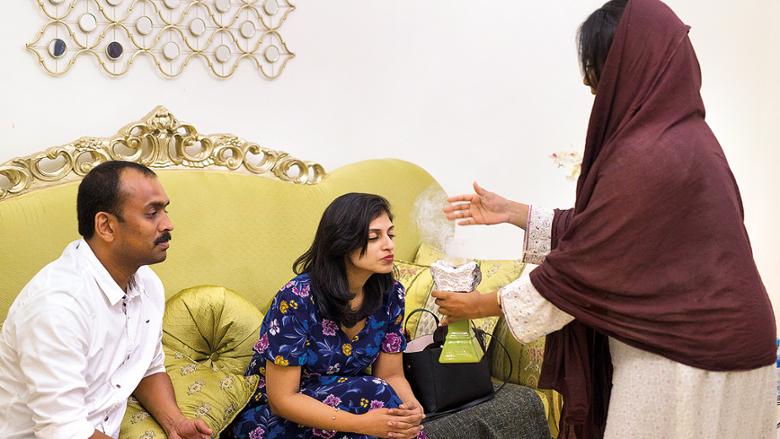
The Scarias close their eyes and breathe in deeply the luxurious scent of oudh.
As they are preparing to leave after an enjoyable and illuminating evening, Maitha suggests some must-see attractions in the capital. ‘The Shaikh Zayed Memorial and the Sheikh Zayed Grand Mosque are musts,’ she says, ‘because the story of the success of UAE is related to the history of the founding father.’
The newly renovated Qasr Al Hosn also should not be missed as it is the oldest building in the Capital. ‘The fort was built when they discovered water in this area. The dhabi (gazelles) lead people to this water source and hence the name Abu Dhabi (father of the Gazelle),’ says Maitha. ‘Then there is the Wahat Al Karama (Oases of dignity) which is a martyr’s memorial for fallen UAE soldiers’.
Also read: 20 must-see pieces at the Louvre Abu Dhabi
As they are set to leave, Julia enquires about Maitha’s plans.
‘I want to change the perception the world has of Emirati women. Most tourists think they can’t even talk to us. I’m trying to deliver a message that the Emirati woman is strong and independent while she holds on to her traditions. I get a few negative comments for allowing men and women to mingle during this experience, but I take it in my stride. We want people to know we are open and adaptable. Because tourists are googling rather than asking us, they fall victims of media prejudices about Arab world. Someone who saw my brother with us four sisters thought it was his four wives!’
Her home experience will soon include an option where the guests can spend a night in an Emirati home and other package deals. She also plans to branch out to Dubai where there will be traditional Khaimah (tents) made of Sadoo (animal hair).
The Scarias leave, enamoured by their first visit to an Emirati household. ‘Maitha put us at ease and it was like talking to a family member,’ says Julia.
‘She was very forthcoming in her answers and we got a lot of notions cleared,’ says Sajan.
Emirati home Experience costs Dh450 for adults, Dh225 for children below 13. For details, contact maitha.essa@hotmail.com or follow experienceabudhabi on Instagram.